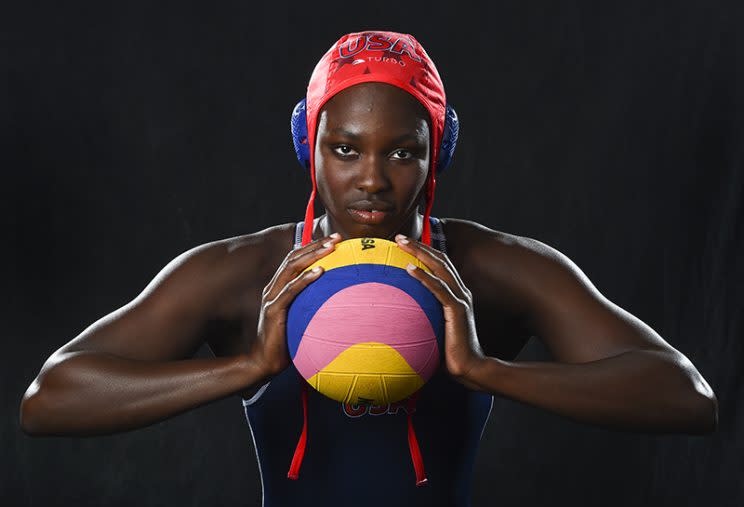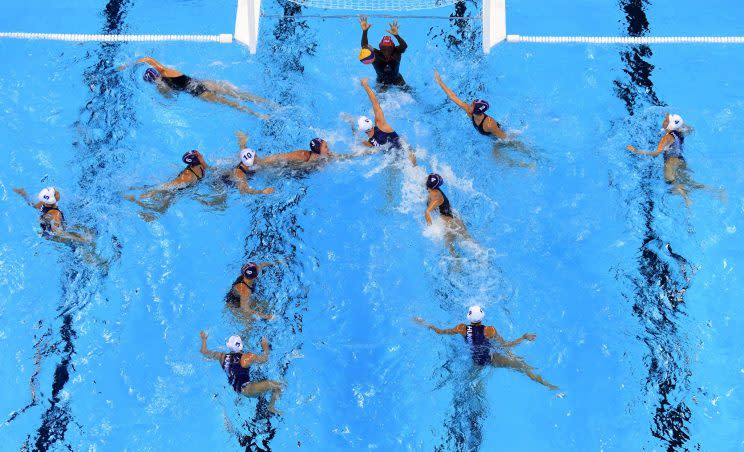Ashleigh Johnson fighting for water polo gold, diversity in her sport

Medal count | Olympic schedule | Olympic news
RIO DE JANEIRO – U.S. water polo goalie Ashleigh Johnson met Serena Williams in the Rio Olympics Athletes’ Village.
OK, “met” is a stretch. “Witnessed,” maybe? It’s more accurate to say she was in the presence of one of her athletic idols but was too bashful to say hello and didn’t even think about asking for a selfie.
But for Johnson, these moments define the Olympic experience. It’s a chance to stroll through a picturesque campus and casually run into athletes that have earned your admiration for years. And if you get up the nerve to interact with these gods-among-mortals, you make a pleasant discovery.
“They’re just other people. You always put athletes up on a pedestal. But they’re just regular people like you,” she said.
Johnson still is that 21-year-old from Miami who attends Princeton. Still likes to watch “Dance Moms.” Still loves roller-blading. Still likes to dabble in the guilty pleasures of cookies-and-cream ice cream. She’s the very definition of “regular people.”
And yet, just by being the goaltender for the U.S. women’s water polo team, which plays Italy in the gold medal match on Friday afternoon in Rio, she knows she’s up on that pedestal for young athletes back home – the ones who never have seen an African-American woman on Team USA before because Johnson is the first.
“I definitely feel the responsibility to be a role model for other black people and minorities because there are so little of us in this sport,” Johnson told TIME.com before the Games. “Just being myself, being black, draws more attention to me. But I didn’t feel like looking different meant I had to play differently, or had to prove anything to anybody. I felt like I could be myself and play as well as anybody else.”
Johnson began as a swimmer in Florida and quickly discovered two things about the sport:
1- She was really good at it.
2- She hated it.
“I don’t like being in my head a lot,” she told TeamUSA.org. “That’s what a lot of swimming was for me, just looking down at the black line (in the bottom of the pool) and thinking about something else rather than what I was doing.”
But water polo … that was different.
“It’s basketball, with one hand,” she said. “And goalie.”
She used to look jealously at the young athletes at her pool club playing it. So she decided to make her mother a deal at 15 years old: If she won a state swimming championship as a sophomore, she could move over to water polo.
She won the bet, winning the 50-yard freestyle state title in Florida. And thus her swimming career ended, and her journey in water polo began.
As a goalie.
Less swimming necessary.
“I feel like water polo is really engaging for me, a good social thing. I didn’t see that with swimming. Water polo is just more fun,” she said.

Johnson first was invited to join national team training camp in 2013, full of athleticism and raw talent. All she knew about the sport on the Olympic level was what she saw on television, watching the U.S. women win gold in 2012. “My idols in the sport were my coaches,” she said. “And the shooters who beat me.”
Johnson played her way onto the 2014 World Cup team that won gold in Russia. To ramp up to the Olympics, she spent a year away from Princeton and trained in California.
And now, she’s in Rio, one win away from Olympic gold.
That’s the standard for the U.S. in women’s water polo, which captured gold in London and has won every major tournament since 2013. All Johnson has known is winning: First place in the Pan-Am Games in 2015. First place in the World League championships in 2015 and 2016. First place at the women’s World Cup in 2014, and the world championships in 2015.
Their hard-fought 14-10 win over Hungary in the Rio Olympics semifinals ensures that the U.S. will medal for the fifth straight Olympics, a.k.a. since women’s water polo joined the Games.
“We knew it was going to be tough. We know they have good shooters. So we tried to focus on defense, but it was our shooting that won the game,” Johnson said.
Which is another way of saying she wasn’t completely pleased with her own effort.
“I would say that I’m not playing to the standard that I like to play,” she said. “But it’s good to be able to rely on my teammates to keep pushing when I fall short, and I’m going to keep pushing until I play my best.”
Her coach, Adam Krikorian, said her standards are high. “But our standards for her are high, too,” he said after the semifinals. “I think she’s had a strong tournament. Today wasn’t her best game; the first three quarters, she struggled a bit. But the good thing was that even with a four-goal lead entering the fourth quarter, she made some big saves early in the fourth to give us some comfort.”
The assurance of a medal isn’t assurance to Johnson.
“Our goal has always been the gold. The pressure’s still there. And it’s good pressure,” she said.

There is, of course, another trailblazer in the water who captured gold in Rio — in the same pool as the gold medal water polo match, no less — and the significance of this symmetry hasn’t been lost on the parade of journalists that have asked Johnson about her: Simone Manuel, the 20-year-old who became the first African-American woman to win an individual Olympic gold in swimming at the 100-meter freestyle.
“I talked to her. I met her at an NBC event,” Johnson said.
Like Johnson, Manuel entered a sport where many of her competitors didn’t look like she did.
“She asked about why didn’t see many others like herself in the sport of swimming, and I didn’t have an answer for her immediately,” said Sharon Manuel, her mother. “We got on the internet and we looked up information. For her, that was the moment that she realized she had a bigger role to play.”
Johnson has felt the same responsibility. Not only just by being an Olympian, but by excelling as one.
“I think I’m important in that I’m bringing people to our sport and I’m helping our team to succeed on this level. It’s really cool to see someone who looks like you excel at a high level in the sport,” she said. “It makes you want to play the sport, and I hope a lot of people realize what a fun sport water polo is.”
And, perhaps one day, one of those players she inspires will work up the nerve to ask Ashleigh Johnson for a selfie in the Olympic Village.
—
Greg Wyshynski is a writer for Yahoo Sports. Contact him at puckdaddyblog@yahoo.com or find him on Twitter. His book, TAKE YOUR EYE OFF THE PUCK, is available on Amazon and wherever books are sold.
Listen to Yahoo Sports’ Greg Wyshynski podcast from Rio on GRANDSTANDING, featuring a Ryan Lochte Controversy Edition with Pat Forde of Yahoo Sports and Bruce Arthur of the Toronto Star!
Live from Rio: Ryan Lochte, international fugitive; the strange side of the Games:
Grandstanding: A Yahoo Sports podcast
Subscribe via iTunes or via RSS feed

 Yahoo Sports
Yahoo Sports 

